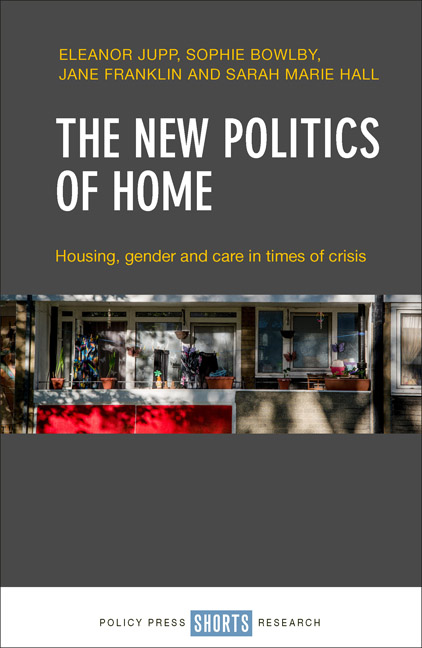Book contents
- Frontmatter
- Contents
- Notes on the authors
- Acknowledgements
- one Introduction: the new politics of home
- two Home economics: home and care in neoliberal policy
- three Caring in domestic spaces: inequalities and housing
- four Relational biographies in times of austerity: family, home and care
- five Spaces of care beyond the home: austerity and children’s services
- six Conclusion: opening up the politics of the home
- Notes
- References
- Index
four - Relational biographies in times of austerity: family, home and care
Published online by Cambridge University Press: 30 April 2022
- Frontmatter
- Contents
- Notes on the authors
- Acknowledgements
- one Introduction: the new politics of home
- two Home economics: home and care in neoliberal policy
- three Caring in domestic spaces: inequalities and housing
- four Relational biographies in times of austerity: family, home and care
- five Spaces of care beyond the home: austerity and children’s services
- six Conclusion: opening up the politics of the home
- Notes
- References
- Index
Summary
Introduction
As previous chapters have shown, in times of austerity, family, home and care come to the forefront of personal and political debates. Austerity cuts have been levelled most significantly at welfare and social care recipients, impacting families and communities who were already struggling beforehand. Recent public spending cuts, such as those in the UK since 2010, have also been distinctly gendered, impacting on the areas of socio- economic life where women are the key recipients or beneficiaries (Pearson and Elson 2015). Since family, home and care likewise are associated with gendered spaces, practices and responsibilities, it stands to reason that women's everyday lives are especially impacted by austerity. Although this is an area of growing academic interest, how austerity is lived in and with remains less understood than we might expect, particularly as it relates to everyday personal lives (Hall 2018b). This therefore raises questions of how to research everyday personal lives, and of research methods, which are the focus of this chapter.
Drawing on thinking across human geography and sociology, and engaging with key concepts such as ‘lifecourses’, ‘personal lives’ and ‘relational biographies’, with this chapter I explore the impact that austerity can have on personal and ‘linked lives’ (Elder 1994). I consider how these interconnected biographies knit together people and relationships, and spaces of home, care and family, in times of austerity. To illustrate these ideas I draw upon three vignettes – from Kerry, Zoe and Selma – collected as part of an ethnographic research study with families and communities in ‘Argleton’ in Greater Manchester, UK. This project took place between 2013 and 2015 and the focus was on everyday social relationships – family, friendship and other intimate relations – in the context of deep spending cuts. Greater Manchester, like many northern towns and cities in the UK, has been particularly badly hit by fiscal austerity policies, and proved to be a fitting place to carry out this research (see Hall 2017 for more details).
The findings described here come from ethnographic encounters, including the use of a biographical mapping tool developed as part of the ethnography. A low- tech participatory technique, the tool was used to focus discussions with participants about their personal biographies, as a way to draw out different types of narrative and forms of data about their personal lives.
- Type
- Chapter
- Information
- The New Politics of HomeHousing, Gender and Care in Times of Crisis, pp. 63 - 86Publisher: Bristol University PressPrint publication year: 2019



